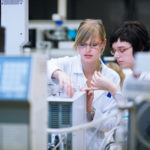
New eye drops developed to treat age-related macular degeneration
Scientists at the University of Birmingham have developed a type of eye drop which could potentially revolutionise the treatment of age-related macular degeneration (AMD) (University of Birmingham, 2017). The results of the collaborative research, published in Investigative Ophthalmology and Visual Science, could spell the end of painful injections directly into the eye to treat AMD. … Continue reading New eye drops developed to treat age-related macular degeneration

Epilepsy drugs could be improved with new targeted approach
New research from the University of Liverpool, in collaboration with the Mario Negri Institute in Milan, published today in the Journal of Clinical Investigation, has identified a protein that could help patients with epilepsy respond more positively to drug therapies (University of Liverpool, 2017). Epilepsy continues to be a serious health problem and is the … Continue reading Epilepsy drugs could be improved with new targeted approach

Cardiff University receives funding for research to prevent bowel cancer
Lyndon Wood, one of the UK’s most successful entrepreneurs, is helping to fund new research into the prevention of bowel cancer (Cardiff University, 2017). The innovative research, which focuses on the link between diet and cancer, is taking place at the European Cancer Stem Cell Research Institute, one of Cardiff University’s flagship research centres. Established … Continue reading Cardiff University receives funding for research to prevent bowel cancer

Stem cell transplants to help treat Huntington’s disease
Cardiff University has announced plans to conduct a stem cell transplantation procedure that could benefit people affected by Huntington’s disease in Wales (Cardiff University, 2017). The Brain Repair and Intracranial Neurotherapeutics (BRAIN) Unit kicked off Huntington’s Disease Awareness Week (May 15th – 21st) by unveiling its intention to perform the first of its pioneering procedures … Continue reading Stem cell transplants to help treat Huntington’s disease

Augmented reality gives surgeons X-ray vision
Augmented reality could soon let surgeons peer inside a patient’s body without needing to make a large incision, helping them to carry out keyhole surgery (New Scientist, 2017). By donning an augmented reality headset, a surgeon will see a virtual 3D map of a patient’s internal organs overlaid directly onto their body as they lie … Continue reading Augmented reality gives surgeons X-ray vision

Heroin combined with non-opioid painkillers leads to a rise in overdose deaths
A multi-disciplinary study has shown that the recent substantial increase in prescriptions for two drugs, pregabalin and gabapentin, used widely for a range of neurological disorders is closely correlated with a rise in the number of overdose deaths in England and Wales (University of Bristol, 2017). These drugs have become drugs of abuse, according to … Continue reading Heroin combined with non-opioid painkillers leads to a rise in overdose deaths

Robotic exoskeletons could prevent falls in older people
Researchers in Italy and Switzerland have developed a prototype robotic exoskeleton that can detect a slip in progress and help its wearer avoid falling (Science, 2017). If perfected, a system like this could one day help millions of older people and amputees maintain balance and avoid serious falls. Some researchers are trying to take preventive … Continue reading Robotic exoskeletons could prevent falls in older people

Minimally conscious people woken for a week
People in a minimally conscious state have been “woken” for a whole week after a brief period of brain stimulation (New Scientist, 2017). The breakthrough suggests scientists might be on the verge of creating a device that can be used at home to help people with disorders of consciousness communicate with friends and family. People … Continue reading Minimally conscious people woken for a week

EKF issues an update on its demerger plans
EKF Diagnostics has said trading has been “comfortably ahead of budget” in the first quarter of the financial year (Insider Media, 2017). The Penarth-based medical diagnostics business has also issued an update on its plans to demerge its two divisions. In a trading update for the three months to March 31st 2017, the directors said … Continue reading EKF issues an update on its demerger plans

ReNeuron secures £1.8m grant
Cell therapy company ReNeuron has secured a £1.8m grant from Innovate UK (Insider Media, 2017). The Cell2Sell grant has been awarded under Innovate UK’s Cell & Gene Therapies Industrial Manufacture grant scheme. It will fund a programme of work to be led by ReNeuron, working with the Cell & Gene Therapy Catapult. The investment will … Continue reading ReNeuron secures £1.8m grant








